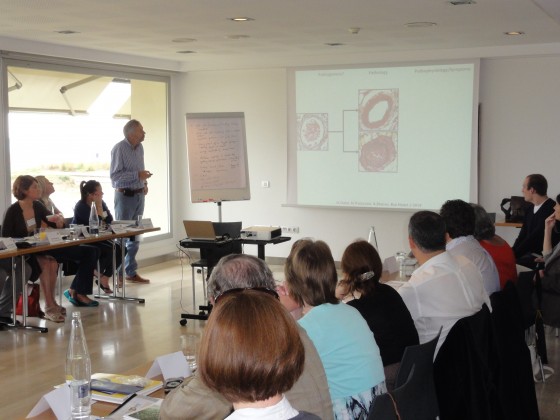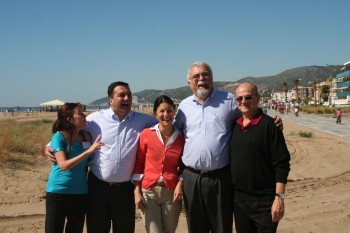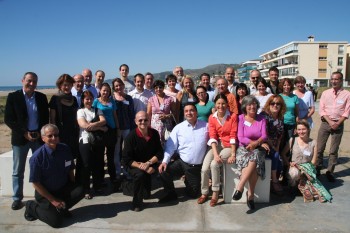Israeli and Turkish delegations joined European and American counterparts in Spain to draw attention to environmental factors causing a killer disease.
Strengthening community will be an integral part of a sustainable future. A “community of angels” in my notes referred to the delegates from more than 20 countries in the European Union, Israel, Turkey and the United States who convened in Castelldefels to discuss Pulmonary Hypertension. The European Pulmonary Hypertension Association conference took place just outside of Barcelona from Sept. 18-20th.
Dr. Iris Tal and I represented the Israel Pulmonary Hypertension Association at the gathering. There, patients, caregivers and clinicians discussed treatment options, drug accessibility, standards of care, research horizons and general support for the victims of the illness.
Rare Disease, Difficult Treatments
Pulmonary hypertension (PH), sometimes referred to as pulmonary arterial hypertension is a rare ailment characterized by abnormally high levels of blood pressure in the lungs that places an excessive load on the heart. Untreated, PH is incapacitating and sometimes fatal. Currently, there is no cure for the disease but over the last few decades a number of treatments have emerged that extend life, increase functional ability and improves the quality of life in patients. None of these treatments are simple but they are essential to maintaining the lives of victims.
PH has a number of causes. It is sometimes congenital and while its diagnosis often takes place later in life it is sometimes detected among newborns. PH also develops secondary to other illnesses such as liver cirrhosis, Gaucher’s disease and disorders involving soft and connective tissue (for example, scleroderma).
I learned at the conference of a third source of PH of which I was not previously aware: PH can also be induced by environmental hazards. For example, one patient and long-time activist acquired PH as a teenager along with other people in her vicinity as a result of a toxic chemical spill in Spain.
Diagnosis
People with PH sometimes live for decades without knowing that their fainting and dizzy spells, shortness of breath, fatigue, blue lips and many other symptoms derive from the condition.
An observant doctor can suspect that a patient has PH but the conclusive diagnosis is dependent on technology, minimally on echocardiography or catherization. Accordingly, patients without financial or other access to these technologies may have their symptoms misattributed to other diseases.
Treatment
Establishing the potential number of people requiring treatment for PH is an important consideration for patients and their advocates. PH, because it is considered rare, is an “orphan disease.” This small population base is cited by pharmaceutical companies as reason to charge high prices for medications (the “gold standard” of PH treatment, Flolan, a substance delivered through a catheter directly to the pulmonary artery 24/7 can cost $100,000 a year or more). As attested by conference delegates coming from poorer countries, the economic concern is a major impediment to treatment in their societies.
We in Israel are very fortunate to have the recognized medicines approved for PH available in the Health Ministry basket. However, often the control of PH requires combinational treatment with more than one medication and obtaining the necessary approvals is a difficult and time-consuming process.
In some countries patients do not have access to combinational therapy or even to the medication of choice that could best control their illness. Certainly such medications are unavailable in many societies elsewhere in the world: they are costly, logistically complicated (many of these medications must be freshly prepared under sterile conditions and require refrigeration; some entail the implantation of catheters and semi-permanent needles and tubing).
They also require specialized equipment (several of these drugs are delivered by a pump attached to the patient). Regardless of what medication they take, many PH patients require supplemental oxygen either around the clock or periodically. Oxygen supply systems, whether fixed in place or portable, also involve major capital expenditure.
Other PH treatment options for PH include lung transplants and radical surgical procedures. These treatment modalities are costly and arduous. Organ donations continue to be scarce the world-over and patients languish and perish while waiting for surgery. One notable exception is Austria where the law stipulates that organs can be harvested from a deceased person unless she or he has explicitly issued instructions to the contrary.
The complexity of PH treatment produces great strain on patients, their families and caregivers.
PH Associations
This need for support and advocacy is the reason why organizations like the Israel PH Association and its European, Turkish and American counterparts have come into being.
These groups fulfill myriad functions including providing financial assistance, counseling, referral, mutual support and lobbying. They act to heighten public awareness and provide information.
A draft statement was issued at the meeting calling for uniform standards of care throughout the constituent countries. Specifically, consistent standards are sought with respect to economic and logistical accessibility of medications and supplies. The delegates resolved to coordinate public awareness campaigns, acquire joint counsel to overcome legal and institutional barriers, and engage a medical authority to monitor research in diagnosis and treatment and to encourage collaboration among hospitals and research institutions. We concurred that medical education is vital to the timely referral of prospective patients for conclusive diagnosis and treatment and intend to focus on increasing knowledge of the disease among primary care clinicians.
Cordial relations transcending borders characterized the entire meeting. This community of angels is interfacing with other patients rights and health advocacy groups across Europe, Israel, Turkey North America, South America and elsewhere to further our common aims.
Its growing successes represents the power of citizens group to effect change.
Dr. Yosef Gotlieb, a contributor to Green Prophet, is a board member of the Israel Pulmonary Hypertension Association. He was diagnosed with PH in 2005.
The Israel PH Association can be contacted at: +972 747-029-092 or at [email protected]. Its patient hotline in Israel is 1-800-74-75-74.
Photos courtesy European PH Association.
Related posts:
Keep Your Arteries Clean With These Dietary Tips
Egyptian Children Interpret MDGs With Disposable Cameras
Rehabilitate and Detox Your Lifestyle in Time for the New Year






